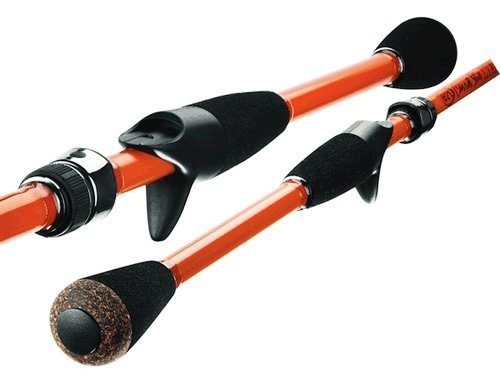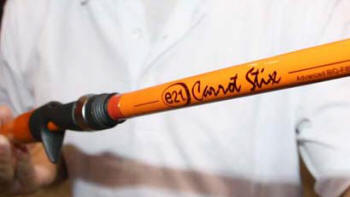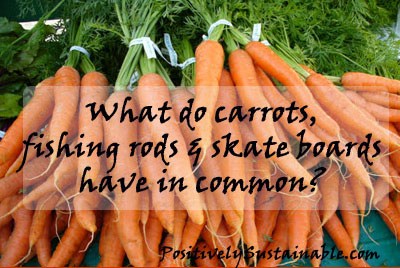Carrots – the New Carbon Fiber
The Ultimate in Green Technology – Carrot Based Skateboards and Fishing Rods
Imagine your next fishing rod or skate board made of carrots.
How about paints & coatings, concrete, drilling fluids, cosmetics, personal care and home care products made with carrots? Yes, carrots. Sounds eco-friendly, doesn’t it. Two Scottish scientists have found a way to convert the root vegetables into an advanced material as strong as conventional carbon fiber. Their company is called CelluComp and their product is Curran®, which is Gaelic for carrots.
Curran®, made from nano-fibers in carrots, turnips, parsnips, and sugar beets (even the GMO variety), was first introduced through the production of a fishing rod called The Reactor™. At the ICAST (International Convention of Allied Sportsfish Trade) convention in Las Vegas, it won the ‘best rod in show’ award. The Reactor™ blended the unique properties of Curran® and carbon fibre, with the former providing light weight, improved impact strength and improved dampening and the later proving ultimate strength. The company makes materials which are around 80 per cent carrot, with carbon fiber making up the remainder. The new “Just Cast” rods are around 50 per cent carrot, each made with around 2kg of the vegetables.

Formula 1 composite technician Alex Luxat is experimenting with Curran® in sheet form to produce a high end skateboard.
Manufacturing Process
The manufacturing process involves breaking down carrots into small particles using a special mechanical process to extract nano fibers (part of the cell wall) found in carrots. The strong nano-fibres can be processed in a variety of ways. Most of the water is removed and hi-tech resins are added to the mix. These fibers are combined with high tech resins which enables them to molded to whatever shape, degree of stiffness, strength or lightness required.

A Sustainable and Green Alternative
Curran® is manufactured from discarded carrot, sugar beet and other root vegetables that would otherwise be thrown away by the food processing industry. CelluComp works with major players in the food processing industry to optimize use of vegetable waste by recycling and reusing their unwanted products. Carrots are the preferred root vegetable. While the properties of other root vegetables work just as well, there is a good local source of them since about 30% of the carrots get rejected and local producers supply CelluCorps with secondary grade materials not used for human consumption. Thus the use of this product does not take away from the agricultural sector.
Curran® has a low carbon footprint due to its efficient process, uses far fewer chemicals and emits no toxic gases into the atmosphere.

Manufactured from extracting cellulose in root vegetables Curran provides an organic alternative to current materials like glass and carbon fibers. The fibers are strong, stiff and light. These properties allow the production of composites with performance characteristics comparable to those based on conventional carbon fiber technology. Bio-composites based on Curran® can be based on a variety of conventional resins such as epoxy, polyurethane and polyester.
The platelet structure of Curran® fibers also makes them effective rheology modifiers in end uses such as paints & coatings, concrete, drilling fluids, cosmetics, personal care and home care products. The rheology modifier is primarily used for controlling viscosity of architectural paints, industrial coatings and plastisols, and for preventing sag during the application and curing of these products. They are also used for preventing pigment sedimentation in inks, coatings and concentrated pigment dispersions.
Eco-friendly paints may now be a thing of the future.
Other Applications
Curran can be used as an Additive in concrete. Curran® has been shown to improve rheological behavior and enhance flexural strength in concrete.
It can also be used as an Additive in drilling fluids for Oil & Gas industry.
Other applications for Curran® include home care, personal care, paper/packaging production, food production, cosmetics and pharmaceuticals.
This exciting product can bring a whole new meaning to “green” (or maybe orange) technology. The only downside of that carrot based fishing rod is that you can’t eat the rod for dinner if you don’t catch any fish that day.




